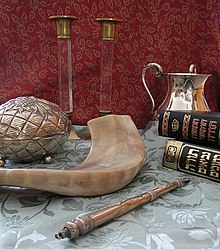Portal:Judaism
The Judaism PortalJudaism (Hebrew: יַהֲדוּת, romanized: Yahăḏūṯ) is an Abrahamic monotheistic ethnic religion that comprises the collective spiritual, cultural, and legal traditions of the Jewish people. Religious Jews regard Judaism as their means of observing the Mosaic covenant, which was established between God and the Israelites, their ancestors. The religion is considered one of the earliest monotheistic religions in the world. Jewish religious doctrine encompasses a wide body of texts, practices, theological positions, and forms of organization. Among Judaism's core texts is the Torah, the first five books of the Hebrew Bible, a collection of ancient Hebrew scriptures. The Tanakh, known in English as the Hebrew Bible, has the same contents as the Old Testament in Christianity. In addition to the original written scripture, the supplemental Oral Torah is represented by later texts, such as the Midrash and the Talmud. The Hebrew-language word torah can mean "teaching", "law", or "instruction", although "Torah" can also be used as a general term that refers to any Jewish text that expands or elaborates on the original Five Books of Moses. Representing the core of the Jewish spiritual and religious tradition, the Torah is a term and a set of teachings that are explicitly self-positioned as encompassing at least seventy, and potentially infinite, facets and interpretations. Judaism's texts, traditions, and values strongly influenced later Abrahamic religions, including Christianity and Islam. Hebraism, like Hellenism, played a seminal role in the formation of Western civilization through its impact as a core background element of Early Christianity. (Full article...) Selected ArticleNight is a work by Elie Wiesel (pictured) about his experience with his father in the Nazi concentration camps at Auschwitz and Buchenwald in 1944–1945. In just over 100 pages of a narrative described as devastating in its simplicity, Wiesel writes about the death of God and his own increasing disgust with humanity, reflected in the inversion of the father-child relationship as his father declines to a helpless state and Wiesel becomes his resentful caregiver. He was 16 years old when Buchenwald was liberated by the U.S. Army in April 1945, too late for his father who died in the camp after a beating. After some difficulty finding a publisher, Wiesel's work appeared in Yiddish in 1955 and French in 1958, and in September 1960 was published in English by Hill and Wang. Fifty years later it is regarded as one of the bedrocks of Holocaust literature. It is the first book in a trilogy—Night, Dawn, Day—marking Wiesel's transition from darkness to light, according to the Jewish tradition of beginning a new day at nightfall. "In Night," he said, "I wanted to show the end, the finality of the event. Everything came to an end—man, history, literature, religion, God. There was nothing left. And yet we begin again with night." (Read more...) Did You Know?Did you know...
Related Categories
Featured Articles
Related PortalsHistory ArticleThe Rhodes blood libel was an 1840 event of blood libel against Jews, in which the Greek Orthodox community accused Jews on island of Rhodes (then part of the Ottoman Empire) of the ritual murder of a Christian boy who disappeared in February of that year. Initially the libel garnered support from the consuls of several European countries, including the United Kingdom, France, the Austrian Empire, although later several supported the Jewish community. The Ottoman governor of Rhodes broke with the long tradition of the Ottoman governments (which had previously denied the factual basis of the blood libel accusations) and supported the ritual murder charge. The government arrested several Jewish subjects, some of whom were tortured and made false confessions. It blockaded the entire Jewish quarter for twelve days. The Jewish community of Rhodes appealed for help from the Jewish community in Constantinople, who forwarded the appeal to European governments. In the United Kingdom and Austria, Jewish communities gained support from their governments. They sent official dispatches to the ambassadors in Constantinople unequivocally condemning the blood libel. A consensus developed that the charge was false. The governor of Rhodes proved unable to control the local fanatical Christians and sent the case to the central government, which initiated a formal inquiry into the affair. In July 1840, that investigation established the innocence of the Jewish community. Finally, in November of the same year, the Ottoman sultan issued a decree (firman) denouncing the blood libel as false. (Read more...) Picture of the WeekIn the News
Featured Quote
WikiProjectsThings You Can Do
Weekly Torah Portion
TopicsAssociated WikimediaThe following Wikimedia Foundation sister projects provide more on this subject:
Discover Wikipedia using portals | |||||||||



























